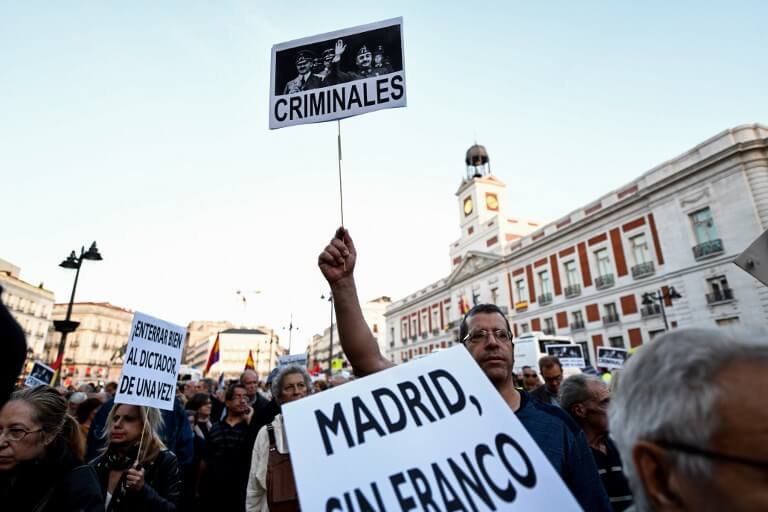The Spanish Congress has approved a new ‘Democratic Memory Law’ that declares illegal the regime of former dictator Francisco Franco and makes the central government responsible for the recovery of the bodies of tens of thousands of people missing from during the Spanish Civil War and the dictatorship.
The new law is an update of the 2007 Historical Memory Law that formally condemned the crimes of the Spanish state that occurred during the fascist dictatorship led by Franco from 1939 until his death in 1975. Many experts and activists agreed that the 2007 law fell far short of emptying the hundreds of still-untouched mass graves and addressing many other issues.
With the new law, however, the government now aims to eliminate loopholes and cover a wider range of victims and crimes related to Francoism. It will also actively promote the search and exhumations of victims buried in mass graves. Under the 2007 law, the state only provided assistance to help families track relatives buried in unmarked graves.
More than 500,000 people died in the war between rebel nationalist forces led by Franco and defenders of a short-lived Spanish Republic. Franco then declared victory on 1 April 1939 and ruled ruthlessly until his death in 1975. Government estimates point to 114,000 civilians who disappeared, presumably killed, throughout the dictatorship. Campaign groups say more than 100,000 bodies are still in unmarked mass graves across Spain. Amnesty International has previously stated that only Cambodia has more mass graves.
The new law also nullifies the legality of the dictatorship’s courts and their rulings. Furtrhermore, it bans the Francisco Franco Foundation, a private institution dedicated to preserving the autocrat’s legacy, and all glorification of the former dictator. The new bill approved on Thursday does not allow for crimes under the dictatorship to be prosecuted, however.
Foundations and associations that defend Francoism or the dictatorship, or that praise their leaders, are to be banned. Fines for non-compliance will range from 200 to 150,000 euros.
The new bill creates a State Prosecutors’ Office for Human Rights and Democratic Memory that guarantees the right to investigate the human rights violations during the war and dictatorship.
The new law declares ‘the illegitimacy of the Francoist courts and the nullity of the sentences and sanctions that they dictated’. It also establishes two official days of memory: on 31 October, to remember and pay tribute to all the victims of the Civil War and dictatorship; and on 8 May, to remember and pay homage to the victims of exile.
The government is to draw up maps of where the bodies of an estimated 100,000 people still missing may be located. It will also set up a DNA bank to help with the identification processes.
‘We will pour our resources into disinterring the remains of those assassinated and who today are still in ditches,’ socialist Prime Minister Pedro Sánchez told parliament before the vote.
The bill also recognises as victims of persecution the native languages and cultures of the Basque, Catalan and Galician regions.
The Valley of the Fallen, a site built by imprisoned Republican soldiers that housed Franco’s remains until late 2019, will also be renamed.
The bill faced massive hurdles in parliament and the left-leaning coalition government between the socialists (PSOE) and left-wing Podemos group needed the backing of smaller, regional parties to get it through.
Just like its predecessor in 2007, the bill failed to achieve a consensus. Some felt it went too far, while others — including the leading grassroots group that helps families organise the recovery of bodies from mass graves, the Association for the Recovery of Historical Memory — claimed it was insufficient.
One issue was that the new law does not modify the pre-constitutional amnesty law of 1977, one of the demands of some of the Catalan pro-independence parties.
The amnesty law, a key element of Spain’s so-called Pact of Forgetting during the transition to democracy, continues to prevent investigations and prosecutions for the crimes that happened during the dictatorship.
Spain’s leading opposition right-wing People’s Party (PP) voted against the new law, vowing to scrap it if the party is returned to office in elections scheduled for next year. Ciudadanos (Cs) and the far-right Vox party also voted against it.
The Catalan pro-independence parties Junts per Catalunya (JxCat) and CUP both also voted against the bill, considering it insufficient, while the Esquerra Republicana (ERC) party abstained; however, PDeCAT voted in favour of the bill. It passed thanks to support from Más País, PDeCAT, and Basque parties PNB and EH Bildu.
The bill will become law once it is approved by the Senate next week.
Since taking power in 2018, Pedro Sánchez has made several moves to address Franco’s legacy, including the exhumation of the dictator in October 2019. Franco’s legacy has remained a very divisive issue in Spain, and even more so since the rise of the far-right Vox party in the past few years, currently the third largest party in the country.

✅ El @Congreso_es ha aprobado hoy el proyecto de #LeyDeMemoriaDemocrática.
— Ministerio de la Presidencia (@M_Presidencia) July 14, 2022
📚La norma pone a las víctimas de la guerra civil y la dictadura en el centro de las políticas públicas y responde a las recomendaciones de organismos internacionales como la @ONU_es.
Dentro🧵 pic.twitter.com/iLx44sjfH7
ALSO READ (21/7/21): New ‘Democratic Memory’ law will help find mass graves of the Franco regime
ALSO READ (20/9/20): Spain drafts bill of ‘Democratic Memory Act’ to redress victims and legacy of Franco regime
ALSO READ (25/10/19): Franco removed but ‘Francoism still very present’, argue many
ALSO READ (16/2/19): Spotlight: ‘When you attack Franco, you attack over half of Spain’
Sign up for the FREE Weekly Newsletter from Spain in English.
Please support Spain in English with a donation.
Click here to get your business activity or services listed on our DIRECTORY.

